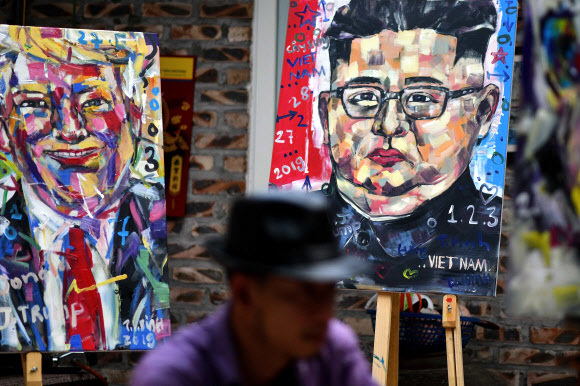 |
|
Portraits of North Korean leader Kim Jong-un and US President Donald Trump in front of a cafe in Hanoi on Feb. 20. (AFP)
|
Remarks seen as attempt to deflate expectations while setting ground for gradual process
On Feb. 19, US President Donald Trump once again remarked that there was no reason to rush the denuclearization talks with North Korea as long as the North was not testing any nuclear weapons or missiles. Coming ahead of the second North Korea-US summit that will be held in Hanoi, Vietnam, on Feb. 27-28, Trump’s remarks are presumably aimed at moderating expectations about the outcome of the summit while announcing his intention to proceed with denuclearization and a peace regime in stages. Trump spoke at length about the North Korea-US summit during his opening remarks at a signing ceremony at the White House for Space Policy Directive-4 and while fielding questions from reporters afterward. “I’d just like to see, ultimately, [the] denuclearization of North Korea. I think we will see that ultimately. I have no pressing time schedule,” Trump said. “I’m in no particular rush. The sanctions are on, the relationships are very strong, and a lot of good things have happened,” Trump said. Trump listed North Korea’s suspension of its nuclear weapons and missile testing, its release of US nationals detained in the North, and the repatriation of the remains of US soldiers as being among his accomplishments. Trump said no fewer than six times that he’s not in a rush. “A lot of the media would like to say, ‘Oh, what’s going on? Speed, speed, speed.’ [But there’s] no rush whatsoever,” he said. “I think a lot of [good] things will come out of it. [. . .] And I think, ultimately, we’re going to be very, very successful.” These remarks appear to mean that Trump intends for North Korea’s denuclearization – which is the ultimate goal of the US’ talks with the North – to be discussed in a series of stages. It can also be seen as attempting to deflate excessive expectations about the outcome of the summit. Trump made similar remarks during a press conference on Feb. 15: “I’m in no rush for speed. We just don’t want testing.” While mentioning that he’d had a phone call with Moon that morning, Trump said that they’d probably discussed “every aspect” of the second North Korea-US summit. Amid these developments, the US State Department announced that US Special Representative for North Korea Stephen Biegun had departed for Hanoi on the same day. Biegun’s counterpart North Korea State Affairs Commission Special Representative for US Affairs Kim Hyok-chol arrived in Hanoi on the evening of Feb. 20 in the company of Choe Kang-il, acting director general for the North Korean Foreign Ministry’s North American affairs bureau, and Kim Song-hye, head of the unification strategy office at the United Front Department of the Workers’ Party of Korea (WPK). Biegun and Kim Hyok-chol are planning to start making final adjustments to the summit agenda as early as Feb. 21. “Steve Biegun is on his way back [to Hanoi] right now to tie up the remainder, and we’re optimistic and looking forward to next week,” said US State Department Spokesperson Robert Palladino. In a related story, Reuters quoted sources in Hanoi as saying that the Vietnamese government is preparing for North Korean leader Kim Jong-un to travel by train. The proposal that Reuters said is being discussed is for Kim to spend two and a half days crossing China by train and reach the Vietnamese border city of Dong Dang on Feb. 25. From there, he would transfer to an automobile to be driven to Hanoi. Reuters also reported that the State Guest House in Hanoi was a likely site for the summit. But diplomatic sources in Hanoi said that Kim’s mode of transportation and the site of the summit are subject to change. By Hwang Joon-bum, Washington correspondent Please direct comments or questions to [english@hani.co.kr]






